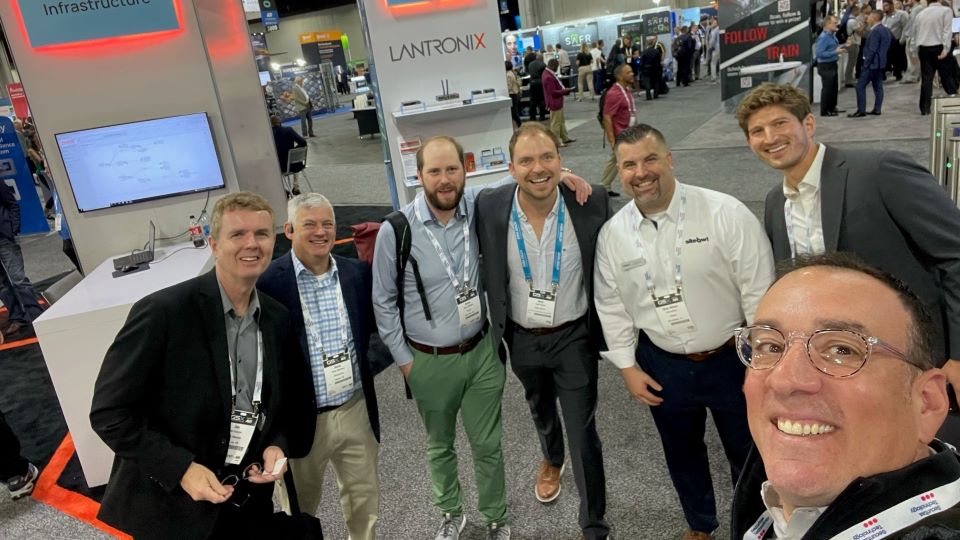SIA’s Proptech Advisory Board at Blueprint 2022


Fresh off of GSX in Atlanta, Georgia, and Blueprint in Las Vegas, Nevada, I can tell you two things:
First, the desire to be in real life is no joke.
Second, conferences have definitely changed (an obvious statement, but purposefully done, as I don’t think we can say it enough) with a focus on networking over technology showcase (and I’m here for it).
Thank you to those who made it to the Security Industry Association (SIA) Proptech Advisory Board meetup at the Alvarado booth. This photo is proof it happened! 😂

For the security industry, GSX is well documented online, so I will focus this blog post on Blueprint and proptech and do it through the eyes of the security industry.
What is Blueprint?
Blueprint is a yearly conference held in September at the Las Vegas MGM and marketed as “the future of real estate tech is here.” So yes, it is about the future, it is about real estate and it is about technology. There were roughly 1,500 attendees made up of real estate startups and incumbents, venture capitalists and industry executives from large and small developers, property managers and operators. So you had people looking for money, people looking to lend money and people looking to spend money. From what I saw, there are a lot of people spending and looking to lend money, but even more are looking for money 😊
Here are some stats from Blueprint’s website to why proptech is so relevant:
- $8.9 trillion global real estate market
- $23+ billion annual investment in real estate tech
- 87% real estate companies which will increase tech adoption
You can tell that Blueprint looks at itself as a curator of an experience, not a trade show or just a conference facilitator. Blueprint is about insights, thought leadership and networking. Full stop, and it didn’t disappoint.
From a security industry attendance point of view, there were 11 companies I saw:
- Active Witness
- Latch
- Homebase
- Brivo
- Swiftlane
- Buzr
- Defigo
- OpenVia
- SMARTKI
- ButterflyMX
- Openpath Security Inc.
From what I can tell, there were four reasons these security companies were in attendance:
- Working a booth/podium, showcasing their products
- Onstage, showcasing their expertise
- Raising money
- Networking
What I found interesting is that the security contingency was heavy access control, heavy intercom and relatively new compared to the incumbent contingency at GSX (arrogantly, I believed I knew most of the access control companies in our industry, and I was happy to meet two new ones). What I found positive for those in attendance was that from a top-of-the-funnel customer perspective, all the big names were there, the right people were in the room and the opportunity to have meaningful conversations was attainable. You just had to make an effort.
Top Takeaways From Blueprint 2022
I attended some of the main stage and innovation presentations, and here are my takeaways:
- Proptech is the third leg of the “tech” stool after Fintech and Biotech. I found this framing to make perfect sense, and it helped me frame it for others when they ask, “What is proptech?” This comparison is necessary because I found at GSX that many of our peers in the security industry have either no view on proptech or a view that proptech is about building management systems (BMS) only. Sure, BMS is part of it, but I hate to break it to you – unless your technology is installed in single-family homes or thin air, it’s property technology (proptech), BMS or no BMS.
- Overall, the market sentiment is cautiously optimistic despite the current slowdown. Most “experts” didn’t feel it was going to last.
- On that note, the venture capital sector is not great right now, but a collective belief is that in Q1 or Q2 of 2023, the market will be back on track. This is great news for the security industry, as there is likely to be continued investment in our industry, especially for companies that serve the proptech vertical (see above…99% of our industry serves proptech).
- What real estate developers/owner-operators are looking for from vendors is:
- Technology that improves properties (✅ for security.)
- Technology that works with others (😐 We have work to do here.)
- Technology that replaces what they are doing today (🤔Not sure how to think about this one as it pertains to security.)
- Technology that adds value with a clear value proposition for primary stakeholders (😏 Seems obvious but must not be, as it had to be stated. The security industry does this but has a hard time telling its story how.)
- On the “works with others” note above, I heard this more than once: “Want to go fast? Go alone. Want to go far? Go together.” The lack of interoperability is why we see many middleware companies looking to integrate all the disparate systems in our industry.
- For multifamily developments, integrations into Yardi and RealPage are pretty much a standard. It is expensive, but if you are going to offer your solution in the multifamily market, plan on the expense. There are a couple of companies in the enterprise space that may resemble the likes of Yardi and Realpage. It will be interesting to track if they get the same level of traction and commitment from the customers to force a need for integration. Too early to tell.
- “AI” is being used beyond leasing and collections, but there is still a value creation story that’s not being told. Yet. Maybe an opportunity for the security industry?
- The General Services Administration has a $13 billion annual construction budget. Nothing more to that data point. I knew it was big but didn’t realize how big.
- The real estate industry wants open standards. I will leave this one alone for the security industry and let that statement speak for itself.
- Sure the market is rough right now, but great companies do great things during bad times, and the market will be better, so keep pushing. It was good to hear this from the people building or remodeling the buildings from whom we sell our products and services.
- Research and development and marketing spending cuts are real right now. No one had any additional thoughts on this or its implications. It was stated several times, so I thought it was worth noting.
- For growth-oriented companies right now, growth doesn’t matter. If you grow 5% or 20%, no one will remember. Focus has shifted to profitability.
- Mergers and acquisitions are slow because strategics are slowing down, but the experts stated the belief that there will continue to be consolidation more than once.
- “The office is dead” is overplayed and is more “the office is being reimagined.” Solutions that are flexible and able to ebb and flow as the customer ebbs and flows are in high demand, yet there are not enough in the market. Security plays a big part in this reimagination. A compelling story is essential and a clear differentiator if you have one.
Conclusion
To summarize, the security industry is positioned as a leading proptech player. It’s our industry’s opportunity to do something about that position. We are an industry that is excited about 8-10% growth in bullish markets. This is a 20-50% growth opportunity. This opportunity will take a bit more forward-leaning mindset and software aggressiveness than we historically show and do. What I walked away with more than anything by attending Blueprint is that if we don’t fill the gap of opportunity, someone else will.
The most relevant takeaway? We as an industry need to show up. Maybe next year we will see 22 companies in attendance from the security industry, including many of you outside of access control.
Looking for an opportunity to do so? Join other SIA Proptech Advisory Board members and me at CREtech New York, billed as “The #1 Real Estate Technology Conference With World Class Content, Networking and Innovation,” in New York City Oct. 12-13.
The views and opinions expressed in guest posts and/or profiles are those of the authors or sources and do not necessarily reflect the official policy or position of the Security Industry Association.
